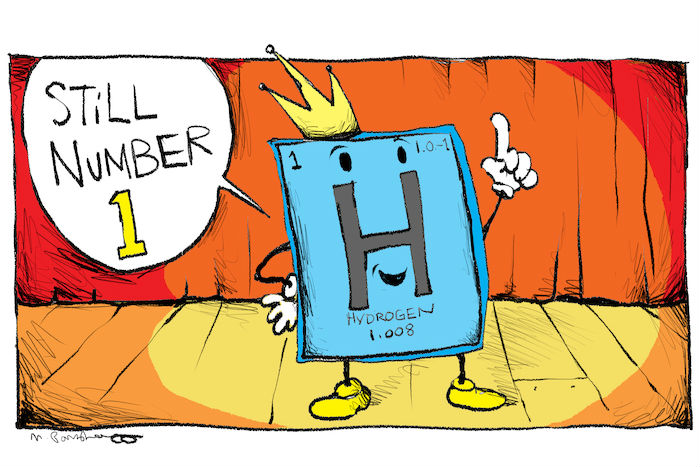A New Element: They Keep Finding New Things. When Will It All Stop?

New elements were announced last month. You may remember elements from the periodic table of elements in chemistry class. There were 94 elements, and you had to memorize them. Things like helium, hydrogen, indium, magnesium, calcium and so forth and so on. You were expected to know them in alphabetical order.
Well, time has marched on since I was in chemistry class and scientists have been digging and digging and now there are 112 elements. Oh, wait a minute. This past week the International
Union of Pure and Applied Chemistry has announced the names of four more, numbers 113 through 118.
This is appalling news for chemistry class students who now have to add nihonium, moscovium, tennessine and oganesson to the periodic table, fitting them in their alphabetical sequence. Memorizing them gets harder and harder. But it is a time for joy and the clinking of champagne glasses for chemists worldwide.
As you might have guessed, three of them are being named after the places where the discoveries were partly made. I say partly because the scientists working on them jointly—hooked up by computer and telephone, I guess—are from Japan, Tennessee, California and Russia. So yes, you get moscovium and tennessine. As for the Japanese contingent, led by professor Kosuke Morita, they chose nihonium. “Nihon” is often translated in Japanese as “Land of the Rising Sun.” The fourth is named for Russian physicist Yuri Oganessian.
There are rules for naming new elements. They can be named after a mythological character or concept, a mineral, a scientist, a property of the element, a place or geographical region, they must end in “ium,” “-ine” or “-on,” and they must translate easily across all major languages.
But unclear is why the new elements are numbers 113, 115, 117 and 118. Is there a black hole problem at 114 and 116? Or are these numbers being set aside for other elements that got beaten to it but will be announced shortly?
A reporter who asked how one of the new elements was found was told that element 113 was found at the end of a chain reaction that began by “bombarding a thin layer of bisumuth with zinc ions traveling at about 10% of the speed of light.”
Nihonium resulted. But then of course it rapidly decayed and then wasn’t there anymore.
So wait a minute. Isn’t this all about finding the different sorts of stuff that earth is made of? Permanently? Iron. Coal. Oil. Gas. I do understand that some of this stuff is the result of elements that got locked together.
Well, yes, that’s part of it. So far, however, scientists have found that meteors that land here from outer space are made up of these same elements, so it is not just about earth stuff but universe stuff. So there could be more. On the other hand, what scientists are discovering and celebrating are not elements that appear naturally on the earth (and so far in the universe), but elements they can create in the lab that they bang together and then name quickly before they all fall apart. So they are sort of manmade elements, temporary elements, like plastic—except that isn’t right, because though plastic is manmade it lasts forever. So it’s like plastic, but not quite.
So who do we think we are that we can bang things together and say they are elements? Forgetting for a moment the new burden this puts on chemistry students, is this right? If, on another planet, someone discovered moscovium for a moment and then it fell apart, would they call that a discovered element?
I think not.
So I say shame on the International Union of Pure and Applied Chemistry for this. There were 94 elements when I went to school. These new ones, 20 or so of them, should be called something else. Call them flash-in-the-pan elements. And don’t make students memorize them.
I should also like to report on what happened when I took chemistry in college and we came up toward the final where I had to memorize all the elements in alphabetical order. I couldn’t do it. I tried. I’d say them out loud rhythmically and get up to the Ks. I could go no farther. And yet, I desperately wanted to pass. But I also would not cheat. What to do?
What I did was, before I came into the classroom to take the test, write down everything from K to Z on a piece of paper, very small, put it in my pocket, go to the men’s room just before I had to write down the answer to the question, look at the paper and began chanting quietly to myself everything from K to Z. I continued chanting the K to Z over and over as I flushed my list down the toilet, went out into the classroom, sat down, took out a pen and, continuing to chant, re-wrote them onto the inside back page of my composition book after which, having now a place where I could legally reference them, I forgot them.
I got an A. Don’t tell anyone about this.



